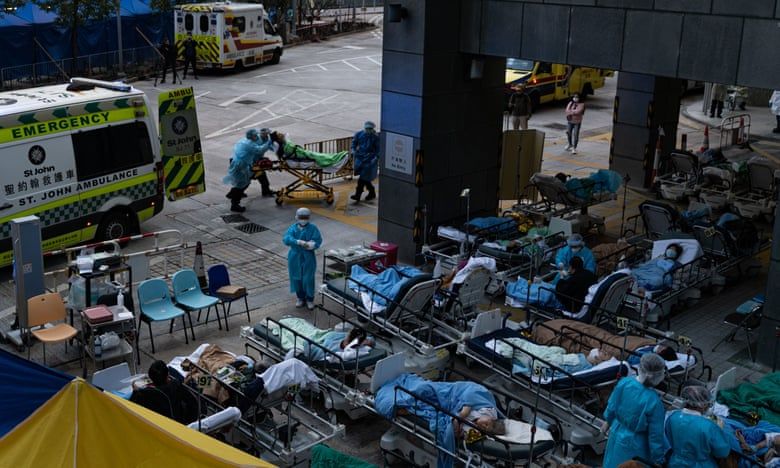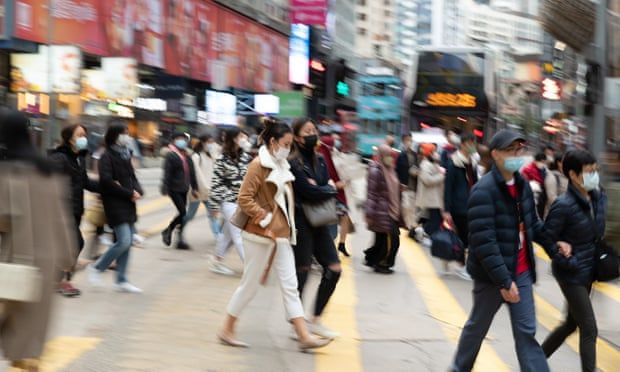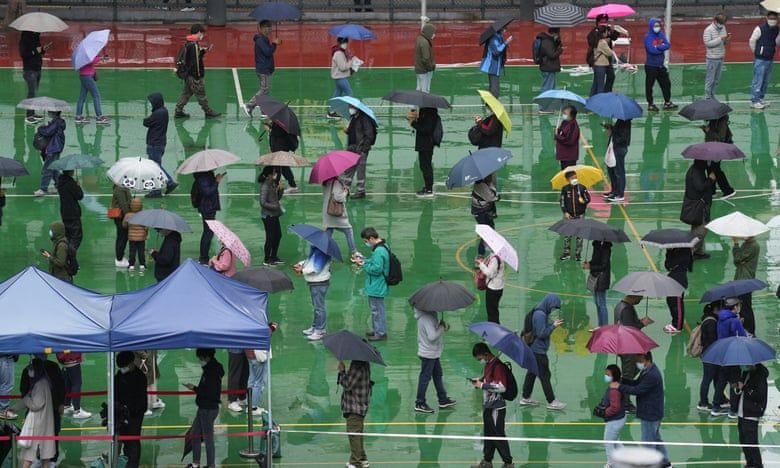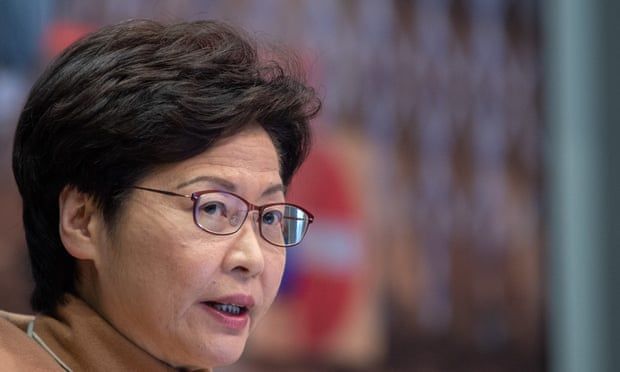Hong Kong News

‘No light at the end’: How Hong Kong’s Covid response went so wrong
The beds pile up outside Hong Kong’s Caritas hospital. In the cold night, elderly patients lie on gurneys covered with blankets and thermal foil sheets. A woman in pink folds her arms against the chill, while another reaches across her bed in an apparent gesture of comfort to a neighbour. Nearby, others crowd into yellow and blue spillover tents lining the car park edges. The hospital staff attend people calling out when they can, but they are outnumbered. Wails from patients carry through the air.
There are similar scenes across the city, where 11 public hospitals were operating at or beyond capacity as of Friday. Private hospitals refuse to take Covid patients. Photos supplied to the Guardian show a treatment room inside one hospital earlier this week (88% capacity) with gurneys three deep across the thoroughfare, on a floor strewn with garbage. Bathrooms that no one has had time to clean were soiled with faeces, dirt and discarded biohazard bags.
Health workers and residents who spent two years after strict Covid controls are now asking how it all went so wrong. The city that had managed to quash outbreak after outbreak was finally being engulfed and the authorities didn’t seem to be ready.
‘Nowhere near the peak’
At North Lantau hospital, a doctor on the emergency ward says frontline medics can no longer keep up with the mounting caseload. More than 10,000 Covid patients are waiting for hospital treatment or isolation during Hong Kong’s Omicron outbreak, with thousands more added to the backlog each day.
The doctor, who asked not be named, says some patients are having to wait outdoors because wards equipped to house Covid patients are perpetually full.
 Patients wait for treatment in a temporary holding area outside the Caritas medical centre in Hong Kong.
Patients wait for treatment in a temporary holding area outside the Caritas medical centre in Hong Kong.
“The most ridiculous thing we’ve seen so far is … a 90-year-old woman lying outside for three days and still she could not be admitted.”
He says medics are spread too thinly to keep a close eye on patients.
“If someone’s condition urgently deteriorates, we may not catch it. It is sheer luck that it has not happened yet,” he says.
Hong Kong has been smashed by a wave of Omicron. It has recorded more than 16,600 cases so far this year, surpassing the Covid totals for 2020 and 2021 combined. At the moment there are about 5,000 people in hospital or isolation, though fewer than 20 are critical and about 60 in a serious condition.
On Friday, chief executive Carrie Lam said next month’s elections for her post would be postponed to 8 May, saying the administration’s focus now had to be on the fight against the pandemic.
Hospital beds were already at 90% capacity because of a policy which saw every positive case hospitalised regardless of symptoms. Close contacts were isolated offsite in government facilities which quickly began to strain. Labs buckled under a requirement for a second test to confirm every “preliminary positive”, with reported delays of up to five days.
“No system is designed to be able to cope with this level of cases,” says government adviser and University of Hong Kong’s dean of medicine, Prof Gabriel Leung.
But it’s going to get worse. “We are nowhere near the peak.”
‘Sandcastles in a tsunami’
Hong Kong social media is littered with mirthless and sarcastic responses of “if only they’d had two years to prepare”.
For most of 2020 and 2021 Hong Kong had one of the world’s most effective responses to the pandemic. It kept total case numbers below 15,000 by quickly crushing outbreaks under a strategy of pursuing zero cases.
The stakes were high. Being Covid-free is Beijing’s requirement for opening its borders to the city, something Hong Kong has prioritised over opening to the rest of the world.
 Under Hong Kong’s ‘dynamic zero’ Covid strategy, people have enjoyed long stretches unencumbered by public health restrictions.
Under Hong Kong’s ‘dynamic zero’ Covid strategy, people have enjoyed long stretches unencumbered by public health restrictions.
Under the “dynamic zero” strategy, Hongkongers enjoyed long stretches of time largely unencumbered by the pandemic, as long as they didn’t need to travel. Between those stretches, when four waves of Covid hit the city, the government introduced restrictions which were often complicated and harsh, sometimes illogical, and changed frequently. But they worked – until Omicron arrived and the system crumbled.
On Thursday more than 6,100 cases were officially recorded. Dr Sarah Ho of the Hospital Authority described a “crisis situation”.
Online, Hong Kong clinical virologist Dr Siddharth Sridhar said the hospitals were “sandcastles in a tsunami”.
“I’ve worked in healthcare in Hong Kong for a decade. Our public hospitals are always stressed. We buckle every time there’s a flu surge.”
The Hospital Authority did not respond to the Guardian’s inquiries.
For health experts, the major current concern is elderly people. Hong Kong had early and plentiful access to vaccines, which have been shown to significantly reduce severe infection. But for a range of reasons the immunisation rates in older age groups are alarmingly low. In aged care homes it is about 20%, says Leung.
He attributes the low rate to early misinformation feeding vaccine hesitancy, but also Hong Kong’s earlier success, which he says led to both a false sense of comfort and a belief among elderly that they were at higher risk from the vaccine side-effects than from getting Covid-19. This far into the pandemic, many had not sought out updated advice.
An insurmountable task?
The government had plenty of warning.
“The big surprise with Omicron is how predictable it really is,” says Leung.
He says daily case numbers may go higher than previous predictions of 30,000, but they need to “flatten the curve”.
Leung says the answer is to reduce mobility and mixing among the population to slow down the spread enough to maintain the integrity of the health system.
 People queue at a makeshift Covid testing
centre in Hong Kong. Experts say some of the more cumbersome health
protocols should be relaxed.
People queue at a makeshift Covid testing
centre in Hong Kong. Experts say some of the more cumbersome health
protocols should be relaxed.
Rumours of a “mainland China style” city-wide lockdown – which were also heavily utilised in other countries including Australia and New Zealand – were ruled out by Lam, on Tuesday, but few people seem to think it’s a concrete promise given how often things have changed.
Lockdowns and social restrictions have had a huge impact on lives and businesses. Jason Lowe, president of the Craft Beer Association of Hong Kong, says their revenue has dropped by more than half.
“For businesses, we already feel like we’re in a dark tunnel with no light at the end,” he says. “Instead of helping us get out, the government’s ever stricter restrictions and lack of support is more like pushing us further inside and trapping us there.”
Prof Ben Cowling, an epidemiologist at the University of Hong Kong, says mild Covid cases should be allowed to stay home.
 Hong Kong chief executive Carrie Lam has said the government is still committed to elimination.
Hong Kong chief executive Carrie Lam has said the government is still committed to elimination.
“At the moment the pressure is from not being able to admit and discharge mild cases quickly enough,” Cowling says. “But in a couple of weeks I fear the pressure is going to come from having too many patients with severe Covid and not with the resources to manage them.”
The spread has slowed a little. Cases in Hong Kong are doubling every three days compared to every 1.5 to 2 in other countries, but it’s not slow enough.
In the meantime the government is still committed to elimination. On Tuesday Lam declared that “surrendering to the virus” was not an option. On Wednesday’s front pages of local pro-Beijing papers Xi Jinping called on her to grasp the “overriding mission” of controlling the outbreak.
Having bet the house on prevention, Hong Kong’s authorities are now faced with a potentially insurmountable task.
“I’m not sure there was a failure to prepare for this type of scenario as there was a failure to anticipate the potential for this type of scenario,” says Cowling.











